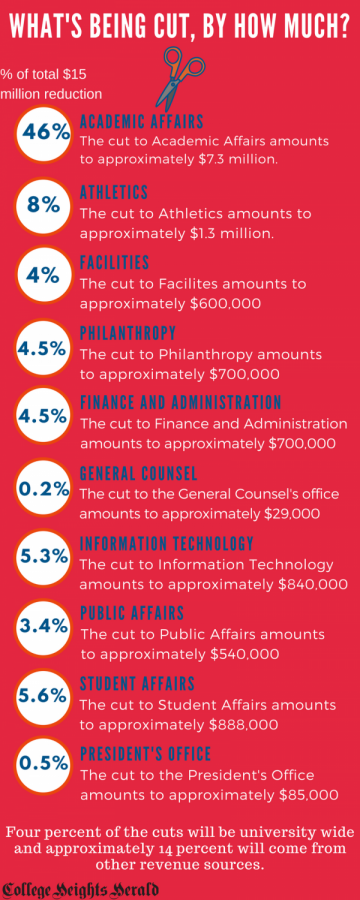Budget Council recommends $15 million in cuts to address deficit
February 24, 2018
The Budget Council’s $15 million reduction to address WKU’s current budget deficit included the elimination of University College, a cut of over $1.3 million to the athletics budget, the transfer of WKU’s three regional campus to the Division of Extended Learning and Outreach and the extermination of 90 to 100 currently filled positions.
These recommendations were presented at today’s Board of Regents meeting.
Budget Council Chair, Indudeep Chhachhi, said they were “very deliberate” during their decision making.
“We recognize that our task was critical to the success of this organization that we all love,” Chhachhi said. “However, we never lost sight that at the end of the day there are people who would be impacted by the recommendations we make.”
President Timothy Caboni said a “hiring slowdown” has been in place at WKU for the past few months. There are approximately 40 vacant positions that will be eliminated, as well an additional 90 to 100 positions, which are filled.
“I know there will be a lot of angst among our employees about which positions are in question,” Caboni said.
Vice presidents and deans will begin to make a list of such positions over the next few days, Caboni said, and a finalized list can be expected by mid-March.
Any terminated employee will be paid by WKU through June 30.
University College’s elimination means the academic programs housed under it would be reorganized to other parts of campus. David Lee, provost and vice president of Academic Affairs, said at a press conference following the regents meeting that no academic programs currently face the threat of elimination.
Academic Affairs makes up nearly half of the percent of total reduction. Forty-six percent from Academic Affairs, or approximately $7.3 million, will go towards the $15 million deficit. This, however, does not mean 46 percent of the Academic Affairs budget will be cut.
A “shared service central model” through DELO was recommended for WKU’s three regional campuses in Glasgow, Elizabethtown-Ft. Knox and Owensboro as a way to “centralize the effort”.
“The goal is to hone our efforts down to the five to seven degree programs connected directly to the local economy, and produce the workforce those communities need to build hand and glove local leadership,” Caboni said in reference to the regional campuses.
Caboni accepted “some portion of” 32 out of the 35 recommendations by the Budget Council, according to an email sent to WKU students.
Other recommendations were forwarded to the Strategic Planning committee.
A four percent campus-wide salary increase pool was recommended for compensation for faculty and staff.
Against the Budget Council’s recommendations, Caboni rejected a proposal freeze any new building projects that would add fixed costs to WKU’s operating budget.
“I don’t want to give up any degrees of freedom we have as an institution or that I have as president,” Caboni said. “More importantly, given the conversation around the $300 million pool of funds that we might be able to access with matching dollars, I don’t want us to not be able to take advantage or situations that are presented to us.”
While this was the first round of cuts, Caboni cautioned that more would follow due to enrollment shifts over the previous four years.
“The next challenge will come in April when we know the results of the state budget which is likely to include a significant reduction in our state appropriation and a substantial increase in our employer contributions to the state pension systems,” Caboni said.
News reporter Emily DeLetter can be reached at 270-745-6011 and emily.deletter304@topper.wku.edu. Follow her on Twitter at @EmilyDeLetter.















